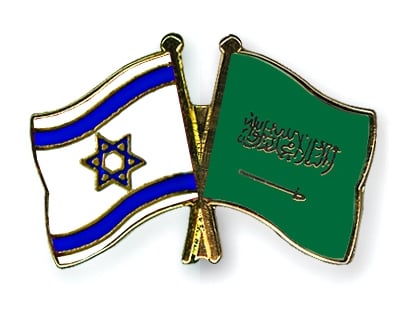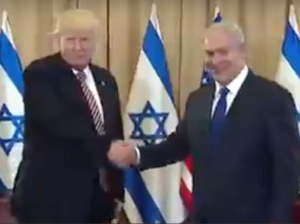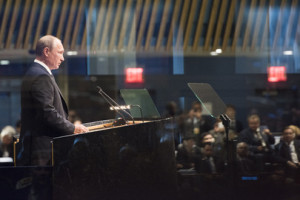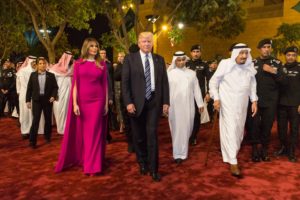Israeli-Saudi Tandem Adjusts to Syria Loss

It seems that matters are coming to a head in the Middle East. For many states, the coming period will likely prove to be the moment in which they determine their futures — as well as that for the region as a whole.
The immediate peg for “crunch time” is Russia’s fast-track proposal of a conference to be held in Sochi, with the near-full kaleidoscope of Syrian opposition invited, which, if all goes as planned, might mean 1,000 delegates arriving in Sochi as soon as Nov. 18.
The Syrian government has agreed to attend. Of course, when one hears of attendance in these numbers, it suggests that this is not intended as a “sleeves rolled-up” working session, but rather as a meeting in which Russian thoughts will be mooted on the constitution, the system of government, and the place of “minorities” – with a chaser that Russia wants fresh elections pretty darned quick: which is to say, in six months’ time. In short, this is to be the “last chance saloon” for opposition figures: come aboard now, or be shut out, in the cold.
Image: President Trump meets with Israeli Prime Minister Benjamin Netanyahu in Israel on May 22, 2017. (Screenshot from Whitehouse.gov)
This initiative has plenty of push behind it, including President Putin’s personal endorsement, but no guarantee of success. Both Iran and Turkey (the co-guarantors of Astana) privately may have reservations, not knowing precisely what Moscow might unveil. Iran is insistent on Syria retaining a strong centralized government, and Turkey is likely to worry about whether the Kurds might receive too much from Moscow; it will also have reservations about sitting down with the YPD (Syrian Kurds), which it views to be little more than a re-branded PKK, which Turkey regards as a terrorist organization. If Turkey does pull out, it will take an important slice of the opposition with it.
Critical moments in history, however, do have a habit of proving to be less critical than first imagined, but this one effectively marks the beginning of the winding up process of the Syrian war and of the 20-year “New Middle East” project (as devised by the U.S. and Israeli governments). How each state responds, will determine the Middle East landscape for the next years.
Military Mop-up
Late last week, the Syrian army took the rest of Deir Ezzor city, and with it its rear now secure, the Syrian army is free to continue the 30 or so kilometers to reach Abu Kamal (al-Bukumal) – the last ISIS urban outpost – and the vital border crossing on the Euphrates with Iraq. It is estimated that there may be 3,500 Da’esh (another name for the Islamic State or ISIS) in Abu Kamal. But Abu Kamal’s “twin” (on the Iraqi side of the border), al-Qaim, was taken by the Iraqi government’s PMU militia forces on Friday. The Iraqi forces are now clearing the city of its estimated 1,500 Da’esh fighters.
The Syrian army, backed up by several thousand recently injected Hezbollah forces, is poised to enter Abu Kamal in the coming days from two directions – and from the south, a co-ordinated thrust north up and into Abu Kamal by the Iraqi Hash’d a- Sha’abi (PMU) militia, will form a pincer.
American-supported SDF (Syrian Democratic Forces), however, are also trying to reach Abu Kamal from the east (the U.S., pressured by Israel, would like to seal and close the border crossing). U.S. allied forces can move more quickly, as U.S. officers are seeking to bribe local tribal leaders who formerly had sworn allegiance to ISIS (with Saudi money), to switch sides, or at least to allow the SDF forces to advance unhindered by ISIS (as happened in the environs of Deir Ezzor).
In short, the military outcome in Syria is done (after six years of war), and now comes the political bargaining. How this plays out will determine the relative strengths of the forces that will shape the Middle East in the coming years. The outcome will likely see whether Turkey can be bullied back towards NATO (by threats such as that by General Petr Pavel, head of NATO’s military committee, warning of “consequences” for Turkey’s attempts to buy Russian air defenses), or whether Turkey’s determination to limit Kurdish aspirations will see Turkey position itself alongside Iran and Iraq (who share a common interest).
Turkey’s role in Idlib, in overseeing the de-escalation zone there, remains opaque. Effectively, its forces are positioned more to control the Afrin Kurdish “canton” (rather than monitor the Idlib de-escalation zone). It is possible that President Recep Tayyip Erdogan is hoping to use Turkish troops to carve out a buffer zone along the Turkish-Syrian border – in contravention to the Astana understandings. If so, this will place him at odds with both Moscow and Damascus (but will not necessarily imply a return to the NATO camp, either).
Syria’s Future
The bargaining at Sochi will also make clearer whether Syria will be a strong centralized state (as Iran prefers), or a looser federal state as America (and perhaps Russia) would prefer. Sochi will be something of a litmus for the extent to which American influence can shape outcomes in today’s Middle East. At present, it looks as if there is co-ordination between Moscow and Washington for a speedy political settlement in Syria, a U.S. declaration of victory over ISIS, Syrian elections, and an American exit from the Syrian theatre.
The outcome of the conference will also perhaps clarify whether the Syrian Kurds finally will remain with the U.S. CentCom project for retaining a permanent U.S. presence in northeast Syria (as Israel wants), or whether the Syrian Kurds will cut a deal with Damascus (after witnessing the crushing of the Barzani Kurdish independence project by neighboring powers).
Image: Russian President Vladimir Putin addresses UN General Assembly on Sept. 28, 2015. (UN Photo)
If the latter occurs, the argument for retaining a longer-term U.S. presence in northeast Syria would lose force. The Saudis will have either to accept defeat in Syria, or act the party-pooper (by trying to re-ignite the remaining proxy forces in Idlib) – but, for that, the kingdom would need Turkey’s compliance, and that may not be forthcoming.
Iraq too, irked by U.S. Secretary of State Rex Tillerson’s comments suggesting that the PMU are Iranian – and must “go home” – has already shown signs of re-orientating towards Russia. (It has recently signed an expansive energy and economic protocol with Russia – after having reclaimed control of its borders and of Iraq’s energy resources – and is procuring Russian arms). Evidence of Iraq’s close connections with Syria, Turkey and Iran was very manifest in the quick execution of the put-down to the Kurdish independence gambit.
But the state facing the biggest dilemma in respect to the Syrian outcome is Israel. Alex Fishman, the doyen of Israeli defense columnists, has written that Israel simply has failed to adjust to strategic change, and is locked in a narrow “cold war” mentality:
“The Syrians fire rockets at open areas: Israel destroys Syrian cannons in response; the Iranians threaten to deploy Shiite forces in Syria: Israel announces ‘red lines’ and threatens a military conflict; Fatah and Hamas hold futile talks on a unity government: the prime minister declares Israel is suspending talks with the Palestinans – and everyone here applauds the security and political echelons: – ‘there, we showed them the meaning of deterrence’, [the Israeli leadership repeats].
“But what we are seeing here is a provincial defense policy, a false representation of a leadership that barely sees beyond the tip of its nose, and is busy putting out fires day and night.
“It’s a leadership that sees national security through a narrow regional viewpoint. It’s as if everything beyond Hezbollah, Hamas and Iran doesn’t exist. It’s as if the world around us hasn’t changed in the past decades, and we are stuck in the era of aggressive solutions in the form of reward and punishment as the main political-security activity. The current political-security echelon isn’t solving problems, isn’t dealing with problems, but simply postponing them, passing them on to the next generation”
Missing the Strategic Picture
What Fishman is pointing to is profound: Israel has gained some tactical victories in the neighborhood (i.e. over the Palestinians generally, and in weakening Hamas), but it has lost sight of the wider strategic picture. In effect, Israel has lost its ability to dominate the region. It had wanted a weakened and fragmented Syria; it had wanted a Hezbollah mired in the Syrian mud, and an Iran circumscribed by Sunni sectarian antipathy towards the Shi’a generally. It is unlikely to get any of these.
Rather, Israel finds itself being deterred (rather than doing the deterring) by the knowledge that it cannot now overturn its strategic weakness (i.e. risk a three-front war) – unless, and only if, America will fully enter into any conflict, in support of Israel. And this is what worries the security and intelligence echelon: Would America now contemplate a decisive intervention on behalf of Israel – unless the latter’s very survival was at risk?
In 2006, Israeli officials recall, the U.S. did not enter Israel’s war against Hizbullah in Lebanon, and after 33 days, it was Israel that sought a ceasefire.
Fishman is right too that attacking Syrian factories and radar positions “out of old habit” solves nothing. It may be sold to the Israeli public as “deterrence,” but rather it is playing with fire. Syria has started to fire back with aged surface-to-air missiles (S200s) at Israeli aircraft. These missiles may not have hit an Israeli jet yet, and maybe were not even intended so to do. The Syrian message however, is clear: these missiles may be old, but they have a longer range than the newer S300: Potentially, their range is sufficient to reach Ben Gurion Airport outside Tel Aviv.
Are the Israelis sure that Syria and Hezbollah don’t have more modern missiles? Are they certain that Iran or Russia will not provide them such? The Russian defense minister was very angry on his visit to Tel Aviv to have been faced with an Israeli retaliatory air attack on a Syrian radar and missile position – as a welcome gift on landing in Israel. To his protests, his Israeli counterpart, Defense Minister Lieberman condescendingly said that Israel needed nobody’s advice in respect to Israel’s security. General Sergey Shoygu reportedly was not amused.
Can Israel come to terms with its new strategic situation? It seems not. Ibrahim Karagul, a Turkish political commentator and an authoritative voice of President Erdogan, writing in Yeni Safak, notes that “the foundations of a new disintegration [and] division are being laid in our region. Saudi Arabia’s ‘We are switching to moderate Islam’ announcement contains a dangerous game. The U.S.-Israel axis is forming a new regional front line.”
Karagul continues:
“We have been watching the strange developments in Saudi Arabia, the United Arab Emirates (UAE), Egypt, Israel and the U.S. for some time now. There is a new situation in the region, which we know is [principally aimed] against Iran; but has recently taken an open anti-Turkey state, aimed at limiting Turkey’s influence in the region … You will see, the ‘moderate Islam’ announcement will be immediately followed by a sudden and unexpected strengthening of Arab nationalism. This wave will not differentiate between Shiite or Sunni Arabs, but it will isolate the Muslim Arab world from the entire Muslim world.
“This separation will be felt most by the Shiite Arabs in Iraq. With this new block, Iraq and Iran are going to stage a new power showdown [i.e. will react forcefully to counter it]. Iraqi Prime Minister Haider al-Abadi’s future in power is also most likely going to [become contingent on the outcome to] this showdown.”
An American ‘Buy-in’
To give this project American “buy-in,” Israel and Saudi Arabia are focusing it on Lebanese Hezbollah, which the U.S. has declared to be a terrorist entity though the movement was part of Lebanon’s government, which was headed by Prime Minister Saad Hariri until he ominously resigned today in an announcement made in Riyadh, Saudi Arabia. (Hariri is a dual Saudi-Lebanese national.)
Saudi State Minister for Gulf Affairs Thamer al-Sabhan (in Beirut last week) called for“toppling Hezbollah” and promised “astonishing” developments in “the coming days. Those who believe that my tweets are a personal stance, are delusional … the coming developments will definitely be astonishing.”
Al-Sabhan added that the kingdom’s escalation against Hezbollah could take several forms that would
“definitely affect Lebanon. Politically, it might target the government’s relations with the world. At the economic and financial levels, it could target commercial exchange and funds, and militarily it might involve the possibility of a strike on Hizbullah by the U.S.-led coalition, which labels Hizbullah a terrorist organization.”
(Comment: this latter point probably was made more in hope, than in expectation. Europe and the U.S. set considerable store on maintaining Lebanon as stable).
Karagul reflects further on this U.S.-Gulf-Israeli initiative:
“The moderate Islam project was tried the most in Turkey. We always said this is ‘American Islam’ and opposed it. The February 28 military intervention is the product of such a project. It was implemented by the U.S./Israel extreme right-wing and their partners on the inside. The Fetullah Terrorist Organization (FETO) is the product of such a project, and the Dec. 17/25 and July 15 attacks were made for this very reason. They were all aimed at trapping Turkey within the U.S./Israel axis.
“But Turkey’s local and national resistance has overcome them all. Now they are burdening Saudi Arabia with the same mission. That is how they are making it appear. I do not think that it is possible for Saudi Arabia to undertake such a mission. This is impossible both in terms of the regime’s character and its social structure. This is impossible because of the ‘Israel/U.S. sauce’.
“The discourse of making the switch to moderate Islam will cause serious confusion in the Saudi administration and grave social reactions. The actual conflict is going to take place within Saudi Arabia. Also, the Riyadh administration has no chance of exporting something to the region or setting an example.
“Especially once it is further revealed that the project is security-based, that a new front line has been formed, that it is all planned by the U.S.-Israel, it will result in a fiasco. This project is suicide for Saudi Arabia, it is a destruction plan; it is a plan that will destroy it unless it comes to its senses.”
Karagul makes the point well: the attempt to make Islam in the Christian “Westphalian” image has a disastrous history. The metaphysics of Islam are not those of Christianity. And Saudi Arabia cannot be made “moderate” by Mohammad bin Salman just ordering it. It would entail a veritable cultural revolution to shift the basis of the kingdom, away from the rigors of Wahhabism to some secularized Islam.
More War?
Where is this taking the Middle East: to conflict? Maybe. But Israeli Prime Minister Benjamin Netanyahu is not noted for his audacity: he his noted more for rhetoric which often has proved empty; and Israeli security officials are being cautious, but both sides are preparing against the possibility of what Karagul calls a “great power showdown.” It looks, though – from this and other Turkish statements – as if Turkey will be with Iran and Iraq, and standing against America and Saudi Arabia.
And President Trump? He is wholly (and understandably) preoccupied with the low-intensity war being waged against him at home. He probably tells Netanyahu whatever it is that might advance his domestic battles (in Congress, where Netanyahu has influence). If Bibi wants a fiery speech at the U.N. berating Iran, then, why not? Trump can then call on the trifecta of White House generals to “fix it” (just as he did with JCPOA, passing it to Congress “to fix”), knowing that the generals do not want a war with Iran.
The danger is a “black swan.” What happens if Israel goes on attacking the Syrian army and industrial premises in Syria (which is happening almost daily) – and Syria does shoot down an Israeli jet?
Alastair Crooke is a former British diplomat who was a senior figure in British intelligence and in European Union diplomacy. He is the founder and director of the Conflicts Forum.




